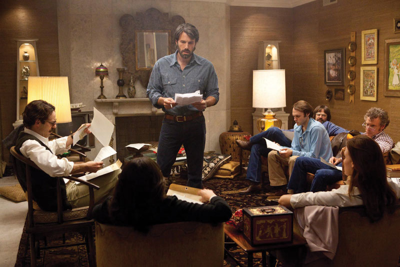Recent history has painted our 39th president, Jimmy Carter, as a failure and a wuss, mostly for two reasons: crippling inflation (which began under Nixon and spiked under Ford, although Carter's policies certainly didn't help) and his response to the Iranian hostage crisis of November 1979. Argo, the new film from actor-director Ben Affleck, revisits the latter through the inside story of an unorthodox rescue mission, the details of which were declassified during the Clinton administration.
Argo's own stealth mission, it seems, is an attempted rehabilitation of Carter and his presidency. No wuss, he; this hazardous, impromptu mission required split-second presidential approval, which the commander-in-chief provided. And as the first 10 minutes of Argo make clear, the hostage crisis itself was a fairly direct result of the U.S.'s longtime support of the Shah's savage regime and our provision of asylum for him following the Islamic Revolution. (The logic was, our other puppet-thugs around the world needed to see that we would back them up in a jam.) So that's Jimmy Carter, folks: no apologies.
Apologies are a recurring theme this election year, choosing as we are between a president who some claim apologizes too much and a billionaire rival who many feel hasn't apologized enough. (Naturally, he's the one with a book titled No Apology.) There's something bigger and thornier underlying this issue — American exceptionalism and the concomitant assumption that our leaders should radiate resolve. But it's a complicated world. "Resolve," which is really just another word for steely machismo, isn't always the way to get things done. Sometimes it takes diplomacy, sometimes subterfuge — and yes, sometimes, it takes an acknowledgment that we got it wrong, and we'll try to do better next time. Carter tested that last strategy somewhat in his much-mocked "malaise" speech, and look where it got him.
So Argo, perhaps shrewdly, plays up the diplomacy and subterfuge, seizing upon an odd historical footnote that presented the president with both circumstance and opportunity. Just before the fall of the U.S. Embassy in Tehran and the round-up of the American hostages, six Embassy employees managed to sneak out a side exit. Miraculously, they made it to the home of Canadian ambassador Ken Taylor (Victor Garber), who concealed them while the Americans hatched an extraction plan.
With no other options, CIA "exfiltration" operative Tony Mendez (Affleck) devises a scenario whereby he and the six U.S. citizens will pose as a Canadian film crew on a location scout for a B-grade science fiction film. With the help of Hollywood makeup artist John Chambers (John Goodman), Mendez sets up a phony production firm in L.A., gets a notice in Variety, then heads to Iran to turn petrified ex-bureaucrats into a plausible pre-production team. (For additional verbal byplay, I suppose, the film adds a fictional character to the real-life tale: a washed-up Hollywood producer named Lester Siegel, played by Alan Arkin.)
The story is undeniably rousing, all the more so for being (mostly) true. What's more, the tension of multiple lives hanging by the thread of preposterous lies — spiced with screenwriter Chris Terrio's pungent Wag The Doggisms ("You scared of the Ayatollah? You haven't gone up against the WGA!") — all but guarantees inherently riveting cinema. Let it be said that Affleck the director navigates several complex plot strands, negotiating them around one another like an ace air traffic controller.
Nevertheless, I came away from Argo with a sour taste. In its exacting re-creation of the sounds and textures of the '79 hostage crisis, as well as its aggressive mood, the film seeks to return us to a moment when the geopolitics of the Middle East were fairly cut and dried, at least as far as most Americans were concerned. We were the good guys, and a bunch of angry barbarians chanting "Death to the Great Satan!" were holding our people. Nothing much mattered beyond that. Argo's prologue explains the U.S. role in installing the Shah (and in the overthrow of Mohammad Mosaddegh in 1953), but the thrust of the film is about seeing post-revolutionary Iranians as a chanting, unsubtitled horde, just as they were on TV in the '70s.
And of course, liberal Hollywood saves the day. Part of the subtext of Argo is that hardliners and butchers though they may be, these gun-toting Shiites are no more immune to the charms of American storytelling than anyone else. In a pivotal scene, the six escapees must clear one more hurdle — a Revolutionary Guardsman questioning the veracity of their cover story. What is this sci-fi movie, "Argo," he presses them? Under threat of death, Joe Stafford (Scoot McNairy), the only member of the Embassy group fluent in Farsi, explains the plot as a tale of peasant revolt, in which a wise man leads emboldened farmers to rise up against a tyrannical alien king.
Yes, he sells this cheap-ass Star Wars rip-off as an allegory of Khomeini's vanquishing of the Shah. Thirty-plus years later, President Ahmadinejad will return the favor, by trying to confiscate every satellite dish in Iran and sending master filmmakers like Jafar Panahi to jail. Argo, for what it's worth, reminds us that cinema and power are always inextricably linked. It simply puts back what the CIA left on the cutting room floor: the cinema.
Email arts@nashvillescene.com.





